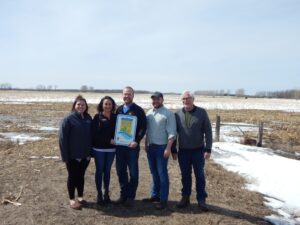Kris Folland really loves soybeans. He loves growing them. He loves talking about and promoting the miracle bean. He loves how soybeans improve his soil and all their value-added uses.
So, it may come as a surprise that after three terms and nine years on the Minnesota Soybean Research & Promotion Council (MSR&PC), Folland is taking a step back. But every good leader knows when it’s time to step away and make room for others.
For Folland, that moment has arrived.
“Nine years is a good number. You can learn a lot and hopefully contribute a lot, but you’ve reached a point where it’s time for someone else to step in and make an impact,” he said. “I believe the Council is in good hands and is headed in the right direction.”
Research-minded
Along with his love of soybeans, Folland also enjoys being involved in his community. He’s also had a passion for research. When fellow Kittson County farmer and past MSGA Director Theresa Gillie, who knows a thing or two about being active and involved, encouraged Folland to run for the Council roughly a decade ago, it seemed like a natural way to combine his dedication to research and community involvement.

“Research has always been No. 1 for me,” Folland said. “As a farmer, you’re always looking for new ways to do the best job you can.”
To appreciate the importance of soy checkoff research, Folland says you need to look back to the past. He notes that the practices and resources we have now, even for simple things such as planting dates and pest management, dates back to checkoff-supported research that was done decades ago. He hopes that the research that’s being done now will eventually become common knowledge or practice in the future.
A key pet project – a “pest” project, rather – for Folland during his tenure has been supporting research projects on soybean cyst nematode and soybean aphids. He knows the research the soy checkoff funds is valid because he’s seen it pay off on his own farm.
“One shining example is the research on the economic threshold for spraying soybean aphids. The research we supported discovered that you shouldn’t spray for aphids unless you hit a certain threshold,” Folland said. “I and many others are better stewards, both environmentally and financially, because of that research the Council supported.”
Council Director Gene Stoel said Folland’s inquisitive nature and passion for research combined for a strong checkoff-supported research program. Folland would also apply some of those same projects to his own operation.
“Kris was very dedicated to research,” Stoel said. “He took it very seriously and wanted to make sure the research was helping the farmers of Minnesota.”
Trucking on biodiesel’s bandwagon
When Folland first joined the Council back in 2015, he quickly discovered there was more to the soy checkoff beyond research, such as discovering new uses, emerging markets and promoting the positive impact of the soy checkoff. That’s when Folland discovered another new passion: biodiesel.
“Right off the bat, (MSR&PC staffer) Mike Youngerberg and I worked together on some collaborative efforts both on the research and promotion of biodiesel,” said Folland. “Biodiesel is great for farmers, it’s great for vehicles, it’s great for the environment…it’s great for everybody.”
Folland played a big role in two major biodiesel milestones for the checkoff: transitioning to B20 and teaming up with the DieselSellerz to promote biodiesel. In 2018, Folland was featured on the “Diesel Brothers” Discovery show. Those two moments collided when Gov. Tim Walz asked to have the custom-built biodiesel truck brought to the Capitol for photos after the B20 mandate was signed into law.
“It was a once-in-a-lifetime, surreal experience. This whole campaign with the DieselSellerz was intended to promote biodiesel, so to get two episodes on prime time was a huge bang for our buck,” Folland said. “It’s priceless advertising for Minnesota Soybean, our farmers and the biodiesel industry.” Leaving a legacy
As Folland steps down, he leaves behind a legacy of being fiscally responsible yet brave enough to think outside the box and recognize the importance of the next big thing.
“Kris is very agronomically proficient and was willing to put himself out there to try new things, which led to him being very successful on our production action team,” said MSR&PC CEO Tom Slunecka, who worked with Folland throughout his three terms. “I am going to miss how pragmatic he was about his research and his understanding of the importance of being willing to take risks every now and then.”
Folland farms with his wife, Bethany, and their four children. While he looks ahead to the next generation of leaders, he hopes his successor, Corey Hanson, who will step on the Council effective July 1, continues advancing the soy checkoff.
“My advice to (Corey) is be very responsible with the checkoff dollars while also looking for new opportunities in areas of research, promotion and investment that we haven’t thought of, because that will be important for the future,” said Folland.
Folland is committed to always being an outspoken supporter of soybeans, which he said has been a boon for farmers in northwestern Minnesota.
“Soybeans are very important to my family and my farm and have played a vital role in our rotation and have done wonders for the land,” he said. “They produce a high-quality protein and oil off of what we consider very marginal land. I love soybeans.”


